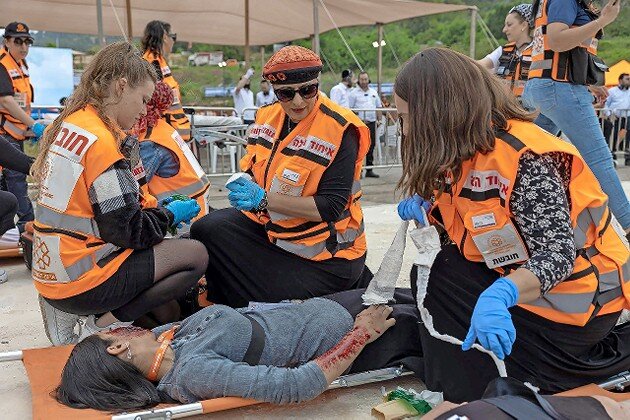United Hatzalah mass-casualty simulation for women
A terrorist opens fire on a bus full of civilians, hitting the driver. The bus crashes into other vehicles, leaving 50 people wounded, some critically.
In minutes, with lights and sirens blaring, women from different backgrounds from all over Israel converge on the scene, wearing protective vests and helmets, in specially equipped motorcycles, ambulances and private vehicles. The first to arrive on the scene, they cut through the fire and smoke and quickly assess the wounded. They categorize and stabilize them and arrange for transport to hospitals.
While the prospect of such an attack is very real, this scenario was a simulated, “mass casualty incident” drill, which United Hatzalah of Israel held in Janana Park in Jerusalem, on April 28.
“We are the only Hatzalah in the world that incorporates women into the EMT team,” said Raphael Poch, United Hatzalah international spokesman and digital media manager and himself an emergency medical technician.
Hatzalah began including women in its program in 2006. Some 1,300 of its current 6,500 volunteers are women — some 20%.
Hatzalah prides itself on being the largest independent, nonprofit, fully-volunteer organization of its kind, which it says provides the fastest, free emergency first-response medical care throughout the country. It does not receive government funding.
Whereas an ambulance’s response time on a good day is between seven and 25 minutes, Poch says Hatzalah volunteers arrive between 90 seconds and three minutes after a call. Once the ambulance arrives, Hatzalah volunteers hand the patient off to the ambulance EMTs for transport to the hospital. If there is no team in the ambulance, Hatzalah volunteers stay to help.
Hatzalah’s volunteers are on call around the clock all the time — including Shabbat and holidays—and they use unique GPS technology and outfitted motorcycles (“ambucycles”) and e-bikes.
Cleveland native Rachel Holzer, an attorney, was an EMT in the 1990s. She arrived in Bet Shemesh in Israel with her family nearly eight years ago from Miami, and she joined Hatzalah when it opened EMT courses for women.
“Before our course, there were only two women, and at first, they were unable to join the local branch,” Holzer told JNS. “After our course, it opened to other women. Now United Hatzalah Beit Shemesh has approximately 40 female volunteer EMTs.”
Women EMTs are needed to help women who give birth en route to the hospital — plans were announced several years ago for Beit Shemesh’s first hospital — and Holzer has delivered one baby in a car. She also remembers a call at a mikvah, a ritual bath, where a woman had cut her leg.
“There was blood everywhere and they called Hatzalah. I took the call,” she said. “Everyone was relieved to see a woman EMT show up at the mikvah that evening.”
Holzer and two of her daughters participated in the drill. One is an EMR (Emergency Medical Responder) and a Hatzalah volunteer, and the other played a “victim,” complete with make-up to simulate real injuries. “It’s her third time, and she loves it,” said Holzer.
Two years ago, Holzer helped secure 100 “victims,” but this time, since it was for just women and girls, she only needed to help recruit 40. Children from Bet Shemesh schools love to participate, according to Poch.
With a recent rise in terror attacks, Hatzalah has been on a mission to train all its volunteers to respond to mass-casualty events, Eli Beer, the nonprofit’s founder and president, stated in a release.
“We’re proud to say that Friday’s drill was a success, and all of the female volunteers who participated were able to gain hands-on knowledge of how to respond quickly and effectively to the scenario we presented,” he added. The group worked together successfully as a team, and the experience “will be vital to them should they ever face such a scenario in the field.” Beer stated.
The drill also included one of Hatzalah’s helicopters. A pilot flew one of the critically “injured” participants to Hadassah Hospital Ein Kerem, where hospital staff practiced receiving a “patient” from a medevac copter.
In the simulation, victims without pulses or who weren’t breathing wore black tags. Volunteers grouped those very critically “injured” together, and instead of performing cardiopulmonary resuscitation, they put CPR masks on participants to indicate how they would treat the latter.
Dr. Joel and Adele Sandberg, parents of former Facebook and Meta executive Sheryl Sandberg, who helped launch Hatzalah’s women’s initiative, attended the drill. Also present were many of those who donated 75 ambucycles and 75 e-bikes to Hatzalah marking Israel’s 75th anniversary.
“Our donors are partners in lifesaving in every sense of the word,” said Dov Maisel, Hatzalah vice president of operations.
In the next five years, Hatzalah hopes to double its number of female volunteers.






